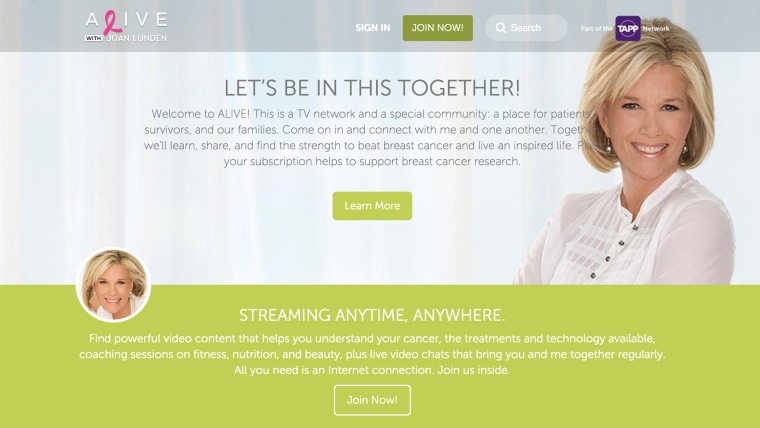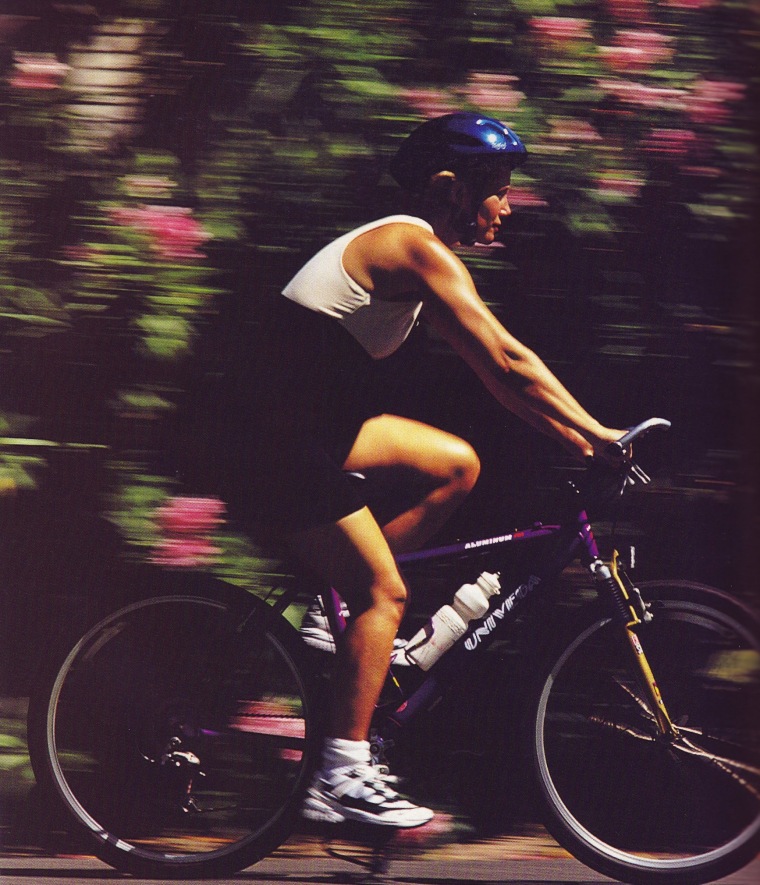What a difference a year makes. Last June, when Joan Lunden was facing the specter of aggressive breast cancer, it was hard to imagine there’d be much to celebrate on the first anniversary of her diagnosis. But today, she’s cancer-free and relishing her new role as advocate for other women.
“I knew early on this would be way more than just my own breast cancer journey,” Lunden told TODAY Health. “Nobody wants to get cancer, but I’m very excited about the fact that now I can actually make a difference in the world.”
It was last summer when Lunden went in for a routine mammogram and a follow-up ultrasound that revealed she had triple negative breast cancer in her right breast.
Joan Lunden: 10 things I wish I knew before I was diagnosed with breast cancer
The veteran journalist underwent nine months of treatment that included 16 rounds of chemotherapy, a lumpectomy and six weeks of radiation.
All along the way, she has shared her journey with TODAY, including a memorable appearance on the plaza with patients and survivors during National Breast Cancer Awareness Month last October.
She’s been crisscrossing the country talking at breast cancer events; launching “ALIVE with Joan,” an online TV channel; and preparing for the publication of her book, “Had I Known: A Memoir of Survival,” which comes out in September.

TODAY Health caught up with Lunden for an update about her life and prognosis. The following is an edited version of that interview.
How are you feeling today?
I’m feeling great. You don’t just all of a sudden bounce back immediately. I can be out on the road and be doing fantastic but then all of a sudden, I’ll find that I’m insanely exhausted.
My hair is growing back, but I’m not exactly ready to go out and walk around without one of my wigs quite yet. It’s at that funny stage — I call it the Chia Pet stage.
I don’t have any more treatment. I am considered by the doctors to be done, finished. The bad news is that triple negative breast cancer, which is a very small subset, is fast growing. It’s aggressive. I guess the good news is that if it’s going to come back, I’ll know it soon. It’s not one of those things that comes back (only after) 10 years.
But I have to assume it’s not coming back because I went through a very rigorous regimen of chemotherapy. I chose to take a very rigorous route because I just wanted to call in the Army, the Navy and the Air Force. It’s cancer, so don’t take any shortcuts.
What have you learned from your experience?
I went from being a patient to being a survivor to being an advocate and really now a bit of an educator.
When you get hit with something like this and you become part of this breast cancer world — it’s like a sorority that you don’t really want to join and the initiation process is not so great. But boy, once you’re in it, it’s so powerful and so compassionate. Everybody just comes to your support and aid and the response I got on social media was so overwhelming and so healing that I really was taught the lesson of how important the power of support is to a patient.
I hear from women all the time who don’t have a close circle of support like that and my heart goes out to them. These breast cancer organizations all over America, they’re there to provide that.
One of the things I have learned over the course of the last year is the strength of community.
What is your main message to women?
Know your own body and be informed. I say that women in their 20s should start doing breast self-exams. They should understand what their own normal is.
If they’re young, sometimes there’s this tendency on the part of a doctor to say, ‘Oh, it can’t be that.’
Women have to be their own best health advocate. If your gut says to you, ‘That was not there a year ago, that doesn’t feel right,’ go for a second opinion. If it doesn’t show up on a mammogram and you still think something is there, insist on an ultrasound.
Once it becomes metastatic breast cancer, it’s very tough for the doctors to keep up with it and to have a good prognosis.
This is my mission now: to try to help save lives.
Joan Lunden's 7 tips for facing breast cancer — or any health crisis
How do you feel about the future?
I’m feeling great because I have to believe that I used the best medicine available to me today. I put together a good team of doctors and they’ve all said: Your prognosis is good.
I’m coming up on my very first mammogram and ultrasound checkup in a few weeks. I’m sure I’ll be a little anxious a few days before that, but I’m not going to live my life fearful every day that maybe it’ll come back. There’s always that chance it could come back, but you can’t live that way.
Today, we live in a wonderful world where women can live through and beyond breast cancer — if you’re vigilant and you get your screening and you catch it early. I have lived through it and I’m going to assume I’m never going to get it again.
What’s next for you?
This summer, I’ll spend a lot of time at our home in Maine. I’m going to take up cycling.

I was recently on a cycling tour making an appearance for Breakaway from Cancer. Patrick Dempsey was there making the appearance with me. He’s become quite a cyclist and so I have a goal: I am going to ride in the Dempsey Challenge on October 17-18 in Maine. (The event raises money for the Patrick Dempsey Center for Cancer Hope & Healing in Lewiston, Maine; the actor’s mother died of cancer last year.)
I figured it’s a fun way for me to try something new because I’m always up for something new.